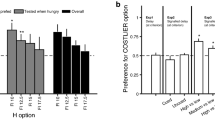Abstract
This paper contrasts a picoeconomic approach to theexplanation of akrasia with Davidson's divided-mind approach and defends theformer in a wider context. The distinctive merits of a picoeconomic model of mindlie in the following aspects: First, it relies on a scientifically well-groundeddiscovery about motivational dynamics of animals for its explanation of preference change,which elucidates or materializes some philosophers' speculations both about thepossible mismatch between valuation and motivation and about the relevance of temporalfactors to akrasia. Second, it grounds the necessity of endogenous higher-order constraints,expressible in forms of judgment, in an intrapersonal dynamic process of interactivefirst-order temporary preferences. Thus the motivational basis for the normativeconstruction of the rationality of `best judgment' can also be illuminated with this model.
Similar content being viewed by others
REFERENCES
Ainslie, G. (1975): ‘Specious Reward: A Behavioral Theory of Impulsiveness and Impulse Control’, Psychological Bulletin82, 463–496.
Ainslie, G. (1982): ‘A Behavioral Economic Approach to the Defence Mechanisms: Freud's Energy Theory Revisited’, Social Science Information21, 735–779.
Ainslie, G. (1992): Picoeconomics, Cambridge: Cambridge University Press.
Audi, R. (1979): ‘Weakness of Will and Practical Judgment’, Noûs 13, 173–189.
Audi, R. (1990): ‘Weakness of Will and Rational Action’, Australasian Journal of Philosophy 68, 270–273.
Davidson, D. (1980): Essays on Actions and Events, Oxford: Clarendon Press.
Davidson, D. (1982): ‘Paradoxes of Irrationality’, in R. Wollheim and J. Hopkins (eds.), Philosophical Essays on Freud, Cambridge: Cambridge University Press, pp. 289–305.
Heil, J. (1989): ‘Minds Divided’, Mind 98, 567–584.
Jackson, F. (1984): ‘Weakness of Will’, Mind 93, 1–18.
Margolis, J. (1981): ‘Rationality and Weakness of Will’, Journal of Chinese Philosophy 8, 9–27.
McDowell, J. (1996): Mind and World, Cambridge, MA: Harvard University Press.
Mele, A. (1987): Irrationality, Oxford: Oxford University Press.
Mele, A. (1995): Autonomous Agents: From Self-control to Autonomy, NewYork: Oxford University Press.
Mele, A. (1996): ‘Socratic Akratic Action’, Philosophical Papers XXV, 149–159.
Pears, D. (1982): ‘How Easy is Akrasia?’, Philosophia 11, 33–50.
Pears, D. (1984): Motivated Irrationality, Oxford: Oxford University Press.
Pettit, P. and Smith, M. (1993). ‘Practical Unreason’, Mind 102, 53–79.
Plato (1953): ‘Protagoras’, in B. Jowett (trans.), The Dialogues of Plato, 4th edn., Vol. 3:358d, Oxford: Clarendon Press.
Walker, A.F. (1989): ‘The Problem of Weakness ofWill’, Noûs 23, 653–676. Department of Philosophy Lingnan University Tuen Mun, Hong Kong E-mail: zhengyj@ln.edu.hk
Author information
Authors and Affiliations
Rights and permissions
About this article
Cite this article
Zheng, Y. Akrasia, Picoeconomics, and a Rational Reconstruction of Judgment Formation in Dynamic Choice. Philosophical Studies 104, 227–251 (2001). https://doi.org/10.1023/A:1010361710316
Issue Date:
DOI: https://doi.org/10.1023/A:1010361710316




